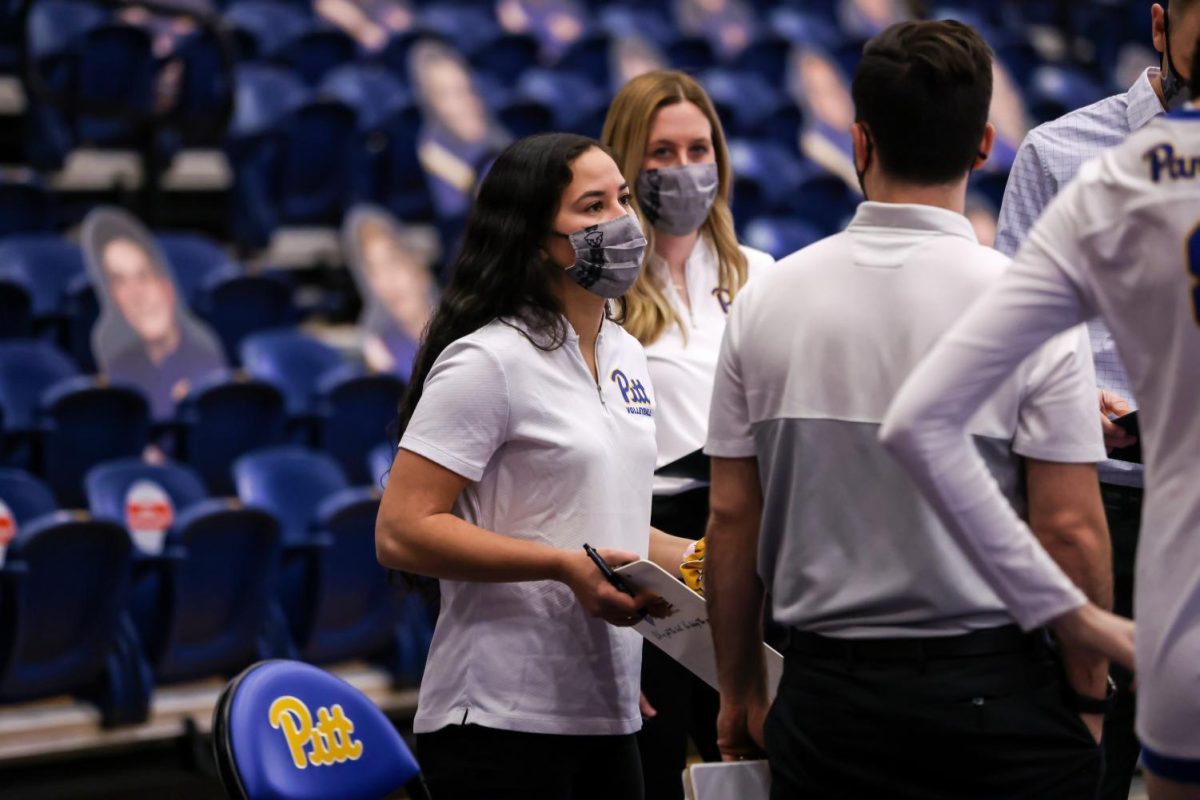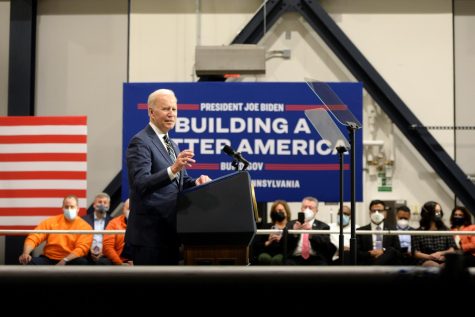USSA makes efforts to increase presence
November 19, 2008
Former Student Government Board president Julie Shepard remembered the controversy that… Former Student Government Board president Julie Shepard remembered the controversy that brewed surrounding the board’s involvement with the United States Student Association.
And USSA, a national student lobbying group to which Pitt pays $4,250 per year to be a member, has become a topic of debate for this year’s SGB.
As the main student lobbying organization in Washington, D.C., USSA says it has had a number of victories. The group championed the College Opportunity and Affordability Act, which increased funding for Pell Grants, fought to renew a bill to assist Iraq veterans with college costs and lowered interest rates on Stafford loans.
“From my perspective, I’ve always looked at it and wondered how [USSA] selected the issues that they did, and again, what Pitt’s role in it was,” said Shepard.
Shepard said that this issue arose while she was on SGB — in 1989. While her board was the first to deal with the issue almost 20 years ago, it wasn’t the last.
During discussion earlier this year, current board member Ryan Haddad said that USSA was “creeping” into SGB.
USSA offers paid contracts
This semester, USSA offered paid contracts to SGB governmental relations chair Pete Hammerle and diversity chair Shannon Martin. USSA recruited them to help organize the organization’s “studentsVOTE!” campaign.
Both Hammerle and Martin received two contracts each; one offered $600 for the semester, and another for $1,200 for additional work during the campaign. If signed, the contracts guaranteed payment in three installments. USSA would pay the last installment after the organizer submitted a final report to USSA.
Hammerle and Martin rejected the contracts, though they continued to work for the organization.
The two contracts offered to compensate individuals who worked as campus organizers registering students to vote, ensuring 65 percent of those people turn out to vote and creating the Student Vote Coalition sponsored by SGB this year.
The organizer would have been required to commit 10 hours per week on the project and remain nonpartisan.
USSA vice president Gregory Cendana, who works for the organization in Washington, D.C., refused to say whether anyone other than Hammerle or Martin had been offered contracts.
Diversity chair Shannon Martin, who organized the project with Hammerle, said she didn’t think the offer was a serious problem.
“It wasn’t really something that was through SGB,” said Martin. “I know I was putting a lot of work in the Student Vote Coalition. The offer that was made to us was just kind of a way to say, ‘We want you to continue doing this work.’”
USSA president and Pitt alum Carmen Berkley said the contracts’ only purpose is to compensate organizers for their time, and Hammerle agreed.
“As a student leader, you get burnt out,” said Hammerle. “It’s kind of like a thank-you.”
Board member Ryan Haddad said he thought accepting a contract would be a conflict of interest.
“The only real air-tight definition of conflict of interest is if money is coming into your pocket because of the vote that you’re making,” said Haddad. “How can we expect our governmental relations committee to remain nonpartisan if they’re being offered compensation by an organization with a partisan agenda?”
Board member Amanda Reed, who worked with the Student Vote Coalition and is also the USSA multi/bi-racial caucus chair, said that she was not offered a contract to work as a paid organizer.
USSA defends nonpartisanship
Hammerle said that he and Martin were to be in charge of the Student Vote Coalition.
This year, USSA required the Student Vote Coalition to distribute voter pledge cards for students to sign. They set a goal of distributing 1,500, and they registered 2,500 students to vote.
“I hereby pledge to vote and stay engaged after the election because I care about the following issues in the GenVote Youth Agenda,” the card says. It provides check boxes of nine issues for students to check.
The card was attached to a Youth Agenda guide, which lists quality and affordable education as its top priority. It listed eight other issues: climate, accessible health care, a healthy economy, safety in homes and streets, world safety, voting rights, rights for new Americans and affordable housing.
The guide listed groups that form its sponsor Generation Vote, including The League of Young Voters, Black Youth Vote, Planned Parenthood, Choice USA and USSA.
Pitt’s Student Vote Coalition coordinators distributed at least 1,500 cards but decided not to distribute the guide. They tore off the GenVote’s agenda and distributed just the white voting pledge cards.
“Some people felt that it was partisan, even though USSA is completely nonpartisan. We decided to overstep the controversy,” said Martin.
The coalition used the cards to contact students to make sure they voted on Nov. 4 and to get an accurate number of students for its database, said Berkley.
Hammerle said that although he personally agreed with many of the issues, he felt that the card clearly expressed partisan views. He felt uncomfortable distributing it to students in the name of SGB.
In the “Safety of Our World” section of the guide, it calls for ending the war in Iraq.
It reads: “How does pissing off the entire world make us safer? Do you honestly think starting wars all over the world makes us safer?”
In another section, it says, “Are YOU going to pick the pesticide-covered strawberries in the blazing sun when my uncle gets deported?”
Despite the card, organizers who accepted the USSA contracts were expected to remain unbiased.
“Your campus campaign must be nonpartisan,” the contract for organizers says. “During your work on this project you are prohibited from endorsing any candidates (local, state or federal), advocating on behalf of any party or producing and distributing any materials that are partisan in nature.”
Although nothing in its constitution or by-laws state that SGB must remain nonpartisan, its members traditionally do so while in office. Only the governmental relations committee is constitutionally held to nonpartisanship.
USSA, as a nonprofit organization, is required by law to remain nonpartisan.
Nonprofit organizations can qualify for filing a 501-C3 tax return as long as they spend 20 percent or less on “issue advocacy,” or supporting a political action.
Whitney McNamara, SGB’s assistant governmental relations chair, said she objected to her committee’s relationship with USSA.
“The importance of USSA as a legitimate and recognized voice on Capitol Hill for students and their education should be stressed,” said McNamara in an e-mail.
She said she became more concerned when she learned about the 20 percent rule, but her fellow Student Vote Coalition members were receptive.
Berkley said USSA was “absolutely fine” with Pitt not distributing the Youth Agenda guide. She said she wasn’t sure why people think USSA is a liberal organization.
“Partisan means [saying] that ‘I’m going to vote for Sen. Ted Kennedy or Sen. Norm Coleman,’” she said. “Nonpartisan is not the same as non-political.”
Former board member Erin Schaefer, who was governmental relations chair in 2006, said staying nonpartisan was easier when she headed the Student Vote Coalition. This year, more political campaigns became involved in voter registration.
“I took it personally upon myself to make sure that the Student Vote Coalition was completely nonpartisan,” said Schaefer, who also voted against funding USSA when she served on the board in 2007.
“In a round-about way, [USSA will] tie themselves into other issues, and they do tend to have a liberal slant.”
Recent criticism abound
Last year’s board voted to begin paying an annual membership fee of $4,250, or 25 cents per student, to become a member of the organization, even though Cendana, the USSA vice president, said Pitt has been a member for 25 years.
Pitt was an affiliate member during that period, but for the most part, it didn’t pay dues. Shortly before Pitt became a member, the USSA conference delegates voted to lower the membership dues from $1 per student to 25 cents.
This year, board member Nila Devanath worked on a USSA-affiliated phone bank project against a proposed affirmative action ban. The project sparked criticism within the board of SGB involvement with USSA during the Oct. 7 meeting. Devanath is the USSA Atlantic Region chair.
Haddad protested that board members were using time and resources for USSA projects.
Devanath and other board members said that the affirmative action ban could come to Pennsylvania and could affect Pitt students. Moved to tears, Devanath insisted that the project affected all students, not just those in Colorado.
After the meeting, Pitt Program Council executive director and former SGB allocations committee member J.J. Abbott prepared remarks to read to SGB. He read them at the Oct. 14 meeting, sharply criticizing SGB involvement with the organization.
“I want to say as emphatically as I can, that USSA is a serious waste of the students’ time, money and resources,” said Abbott. “Quite frankly, we can do what they claim to do better ourselves … For far too long, pushing the agenda of USSA has been an excuse to say SGB is representing Pitt students to government.”
Pitt is one of only two member schools in the Mid-Atlantic region for USSA, which includes Pennsylvania, Delaware, Maryland and Washington D.C.
USSA does not list a charter of its member schools on its Web site. It lists a board of directors, which include Reed, Devanath and Student Vote Coalition member Aster Teclay.
Cendana said there wasn’t a specific reason that the member schools weren’t listed on USSA’s Web site. He later said he did not feel comfortable giving a list of charter members to the media.
The only indication of what schools are members of USSA, according to its Web site, is the e-mail addresses of the directors. They appear to be from several University of California schools, University of Oregon, University of Wisconsin-Madison and University of Massachusetts Amherst, among others.
USSA has history of controversy
Pitt alumna Julie Shepard served on SGB as a board member in 1989 and president in 1990.
“We were invited to participate [in USSA]. We looked very closely at their agenda, and at that time, the agenda of USSA did not match what we were trying to do,” said Shepard. “Whenever we were [discussing], USSA was more renegade than anything else.”
Shepard said that during her time in SGB, the governmental relations committee already worked with university, state and federal levels of government.
Shepard’s board withdrew from USSA membership. She said she remembers that SGB’s affiliation varied from year to year, depending on which boards had members who devoted the most time and effort to USSA.
Reports in The Pitt News since then confirm that the issue has resurfaced time and again since Shepard’s tenure on the board.
The Pitt News published headlines such as “Students may vote on USSA,” “SGB-USSA connection questioned” and “SGB, USSA register student voters” as early as 2002.
Hammerle said he thinks that USSA could be a more useful organization on campus.
“I like what they stand for, but I think we need to more clearly, as a campus, define their role,” he said. “I think it should be an organization that helps us accomplish our goals.”
Board members Reed and Devanath have expressed support of a student referendum on paying USSA membership dues.
Shepard said that when she served on the board, the issue came down to a question that boards after hers have also faced: whether to focus SGB resources on national goals or University initiatives.
“We strongly decided in favor of being local,” said Shepard.







